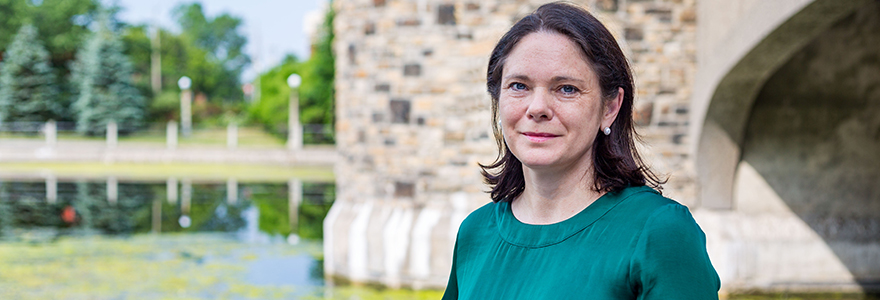Embracing the Unexpected
 Throughout her education and career, Tammy Clifford has embraced the unexpected and it has led to exactly where she should be
Throughout her education and career, Tammy Clifford has embraced the unexpected and it has led to exactly where she should be
By Jennifer Parraga, BA’93
If you had to do it all over again, would you do a PhD?
“Unequivocally yes,” said Tammy Clifford, PhD’02.
“During your training, you won’t only learn methods and statistics techniques, you learn a whole new way of thinking in a disciplined manner, of seeking and gathering evidence and how to communicate that back to different audiences from the scientific world to the broader community.”
The pointed question was asked of Clifford as part of a virtual panel discussion with current epidemiology and biostatistics graduate students at Schulich Medicine & Dentistry.
Clifford, who is the Vice President, Research Programs for the Canadian Institutes of Health Research has spent the entirety of her nearly 20-year career in leadership roles – all connected to science and all utilizing the skills she honed during her graduate training at Western University.
Born in Southwestern Ontario and raised in Oakville, she was the first in her family to attend university. Her father encouraged her to see the great possibilities of postsecondary education. Unknowingly, he also helped her to realize and think about the fundamental inequities that exist in society and their influence on health and life experience.
“In a sense, my dad really influenced my decision to pursue epidemiology and left me promising to dedicate my work to making life better for everyone,” she said.
There wasn’t a straight-line path to the field, however. During her undergraduate studies, Clifford hoped for a career in medicine – bringing together her desire to help people and a prowess for science and math. Medicine, however, wasn’t meant to be, and Clifford was faced with finding a new path. She found that direction with a master’s in occupational health. She says it was during an epidemiology course during her master’s that she had a eureka moment and realized what she wanted to do.
“Being admitted to the epi-bio program was life-changing,” she said.
With mentorship and support from Karen Campbell, PhD’88, her supervisor, and Kathy Speechley, PhD’87, her advisor, Clifford spent six years soaking up all things academia.
Working in her second-floor office in the Kresge Building, she pursued her research and wrote her thesis investigating whether breastfeeding reduces the incidence of colic in babies. Her research included recruiting 850 mothers and their newborns and following each one for six months looking at crying patterns, how they were fed and when they were fed. In the end, the evidence showed that colic doesn’t have anything to do with what the baby is fed. She also identified that there was a direct connection between crying babies and shaken baby syndrome.
Clifford looks back at those years during her graduate training with great fondness. And she is proud to be an alumna from a School with such a rich history.
“I’m pretty privileged to have been accepted into the program and for Karen to have taken a chance on me,” she said. “The training I received was excellent, the program is internationally recognized, it’s known and it’s trusted. I’m proud to be affiliated with a top-notch institution.”
Fully expecting to continue her career in London, Clifford’s plans changed as her partner landed a job in Ottawa. A move to the nation’s capital and with support and guidance from fellow women in science, Clifford’s career began to take off.
“My career has gone in directions that I never anticipated,” Clifford said. “But each role I have held has had some element of science in it and I still use the things I learned during my training, specifically critical thinking, questioning the status quote and the imperative of evidence-informed decisions.”
Clifford says that her unique career path is a recognition that you can blend science and research with leadership and administration and she hopes that will stand as an example to others doing their graduate training and looking to the future for a pathway.
Now a member of the leadership team at the country’s most significant scientific agency, Clifford has become a leader to watch and a role model for young women in science.
“I don’t see myself as a role model, at least in terms of setting out to be one,” she said. “But I know there are young women who do look to me that way. It’s wonderful to hear, and other than my own children, nothing brings me more joy than knowing you have touched someone’s life.”








